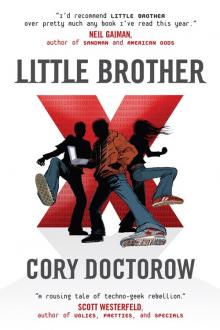Little Brother by Cory Doctorow (best books to read fiction txt) 📕

- Author: Cory Doctorow
- Performer: 0765319853
Book online «Little Brother by Cory Doctorow (best books to read fiction txt) 📕». Author Cory Doctorow
Ange squeezed my hand. "God, I hate that woman," she said.
I nodded. "Just one more rotten thing this country's done to Iraq," I said. "If they sent her to my town, I'd probably become a terrorist."
"You did become a terrorist when they sent her to your town."
"So I did," I said.
"Are you going to Ms Galvez's hearing on Monday?"
"Totally." I'd introduced Ange to Ms Galvez a couple weeks before, when my old teacher invited me over for dinner. The teacher's union had gotten a hearing for her before the board of the Unified School District to argue for getting her old job back. They said that Fred Benson was coming out of (early) retirement to testify against her. I was looking forward to seeing her again.
"Do you want to go get a burrito?"
"Totally."
"Let me get my hot-sauce," she said.
I checked my email one more time -- my PirateParty email, which still got a dribble of messages from old Xnetters who hadn't found my Coalition of Voters address yet.
The latest message was from a throwaway email address from one of the new Brazilian anonymizers.
Found her, thanks. You didn't tell me she was so h4wt.
"Who's that from?"
I laughed. "Zeb," I said. "Remember Zeb? I gave him Masha's email address. I figured, if they're both underground, might as well introduce them to one another."
"He thinks Masha is cute?"
"Give the guy a break, he's clearly had his mind warped by circumstances."
"And you?"
"Me?"
"Yeah -- was your mind warped by circumstances?"
I held Ange out at arm's length and looked her up and down and up and down. I held her cheeks and stared through her thick-framed glasses into her big, mischievous tilted eyes. I ran my fingers through her hair.
"Ange, I've never thought more clearly in my whole life."
She kissed me then, and I kissed her back, and it was some time before we went out for that burrito.
Afterword by Bruce Schneier
I'm a security technologist. My job is making people secure.
I think about security systems and how to break them. Then, how to make them more secure. Computer security systems. Surveillance systems. Airplane security systems and voting machines and RFID chips and everything else.
Cory invited me into the last few pages of his book because he wanted me to tell you that security is fun. It's incredibly fun. It's cat and mouse, who can outsmart whom, hunter versus hunted fun. I think it's the most fun job you can possibly have. If you thought it was fun to read about Marcus outsmarting the gait-recognition cameras with rocks in his shoes, think of how much more fun it would be if you were the first person in the world to think of that.
Working in security means knowing a lot about technology. It might mean knowing about computers and networks, or cameras and how they work, or the chemistry of bomb detection. But really, security is a mindset. It's a way of thinking. Marcus is a great example of that way of thinking. He's always looking for ways a security system fails. I'll bet he couldn't walk into a store without figuring out a way to shoplift. Not that he'd do it -- there's a difference between knowing how to defeat a security system and actually defeating it -- but he'd know he could.
It's how security people think. We're constantly looking at security systems and how to get around them; we can't help it.
This kind of thinking is important no matter what side of security you're on. If you've been hired to build a shoplift-proof store, you'd better know how to shoplift. If you're designing a camera system that detects individual gaits, you'd better plan for people putting rocks in their shoes. Because if you don't, you're not going to design anything good.
So when you're wandering through your day, take a moment to look at the security systems around you. Look at the cameras in the stores you shop at. (Do they prevent crime, or just move it next door?) See how a restaurant operates. (If you pay after you eat, why don't more people just leave without paying?) Pay attention at airport security. (How could you get a weapon onto an airplane?) Watch what the teller does at a bank. (Bank security is designed to prevent tellers from stealing just as much as it is to prevent you from stealing.) Stare at an anthill. (Insects are all about security.) Read the Constitution, and notice all the ways it provides people with security against government. Look at traffic lights and door locks and all the security systems on television and in the movies. Figure out how they work, what threats they protect against and what threats they don't, how they fail, and how they can be exploited.
Spend enough time doing this, and you'll find yourself thinking differently about the world. You'll start noticing that many of the security systems out there don't actually do what they claim to, and that much of our national security is a waste of money. You'll understand privacy as essential to security, not in opposition. You'll stop worrying about things other people worry about, and start worrying about things other people don't even think about.
Sometimes you'll notice something about security that no one has ever thought about before. And maybe you'll figure out a new way to break a security system.
It was only a few years ago that someone invented phishing.
I'm frequently amazed how easy it is to break some pretty big-name security systems. There are a lot of reasons for this, but the big one is that it's impossible to prove that something is secure. All you can do is try to break it. -- if you fail, you know that it's secure enough to keep you out, but what about someone who's smarter than you? Anyone can design a security system so strong he himself can't break it.
Think about that for a second, because it's not obvious. No one is qualified to analyze their own security designs, because the designer and the analyzer will be the same person, with the same limits. Someone else has to analyze the security, because it has to be secure against things the designers didn't think of.
This means that all of us have to analyze the security that other people design. And surprisingly often, one of us breaks it. Marcus's exploits aren't far-fetched; that kind of thing happens all the time. Go onto the net and look up Òbump keyÓ or ÒBic pen Kryptonite lockÓ; you'll find a couple of really interesting stories about seemingly strong security defeated by pretty basic technology.
And when that happens, be sure to publish it on the Internet somewhere. Secrecy and security aren't the same, even though it may seem that way. Only bad security relies on secrecy; good security works even if all the details of it are public.
And publishing vulnerabilities forces security designers to design better security, and makes us all better consumers of security. If you buy a Kryptonite bike lock and it can be defeated with a Bic pen, you're not getting very good security for your money. And, likewise, if a bunch of smart kids can defeat the DHS's antiterrorist technologies, then it's not going to do a very good job against real terrorists.
Trading privacy for security is stupid enough; not getting any actual security in the bargain is even stupider.
So close the book and go. The world is full of security systems. Hack one of them.
Bruce Schneier
Afterword by Andrew "bunnie" Huang, Xbox Hacker
Hackers are explorers, digital pioneers. It's in a hacker's nature to question conventions and be tempted by intricate problems. Any complex system is sport for a hacker; a side effect of this is the hacker's natural affinity for problems involving security. Society is a large and complex system, and is certainly not off limits to a little hacking. As a result, hackers are often stereotyped as iconoclasts and social misfits, people who defy social norms for the sake of defiance. When I hacked the Xbox in 2002 while at MIT, I wasn’t doing it to rebel or to cause harm; I was just following a natural impulse, the same impulse that leads to fixing a broken iPod or exploring the roofs and tunnels at MIT.
Unfortunately, the combination of not complying with social norms and knowing “threatening” things like how to read the arphid on your credit card or how to pick locks causes some people to fear hackers. However, the motivations of a hacker are typically as simple as “I’m an engineer because I like to design things.” People often ask me, “Why did you hack the Xbox security system?” And my answer is simple: First, I own the things that I buy. If someone can tell me what I can and can’t run on my hardware, then I don’t own it. Second, because it’s there. It’s a system of sufficient complexity to make good sport. It was a great diversion from the late nights working on my PhD.
I was lucky. The fact that I was a graduate student at MIT when I hacked the Xbox legitimized the activity in the eyes of the right people. However, the right to hack shouldn’t only be extended to academics. I got my start on hacking when I was just a boy in elementary school, taking apart every electronic appliance I could get my hands on, much to my parents’ chagrin. My reading collection included books on model rocketry, artillery, nuclear weaponry and explosives manufacture -- books that I borrowed from my school library (I think the Cold War influenced the reading selection in public schools). I also played with my fair share of ad-hoc fireworks and roamed the open construction sites of houses being raised in my Midwestern neighborhood. While not the wisest of things to do, these were important experiences in my coming of age and I grew up to be a free thinker because of the social tolerance and trust of my community.
Current events have not been so kind to aspiring hackers. Little Brother shows how we can get from where we are today to a world where social tolerance for new and different thoughts dies altogether. A recent event highlights exactly how close we are to crossing the line into the world of Little Brother. I had the fortune of reading an early draft of Little Brother back in November 2006. Fast forward two months to the end of January 2007, when Boston police found suspected explosive devices and shut down the city for a day. These devices turned out to be nothing more than circuit boards with flashing LEDs, promoting a show for the Cartoon Network. The artists who placed this urban graffiti were taken in as suspected terrorists and ultimately charged with felony; the network producers had to shell out a $2 million settlement, and the head of the Cartoon Network resigned over the fallout.
Have the terrorists already won? Have we given in to fear, such that artists, hobbyists, hackers, iconoclasts, or perhaps an unassuming group of kids playing Harajuku Fun Madness, could be so trivially implicated as terrorists?
There is a term for this dysfunction--it is called an autoimmune disease, where an organism's defense system goes into overdrive so much that it fails to recognize itself and attacks its own cells. Ultimately, the organism self-destructs. Right now, America is on the verge of going into anaphylactic shock over its own freedoms, and





Comments (0)